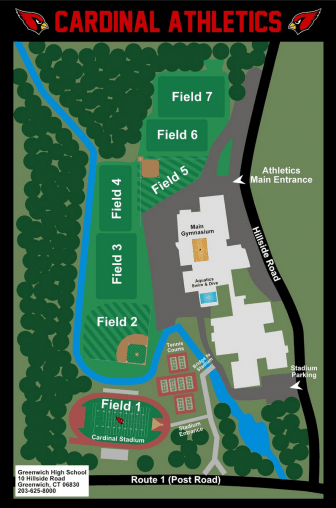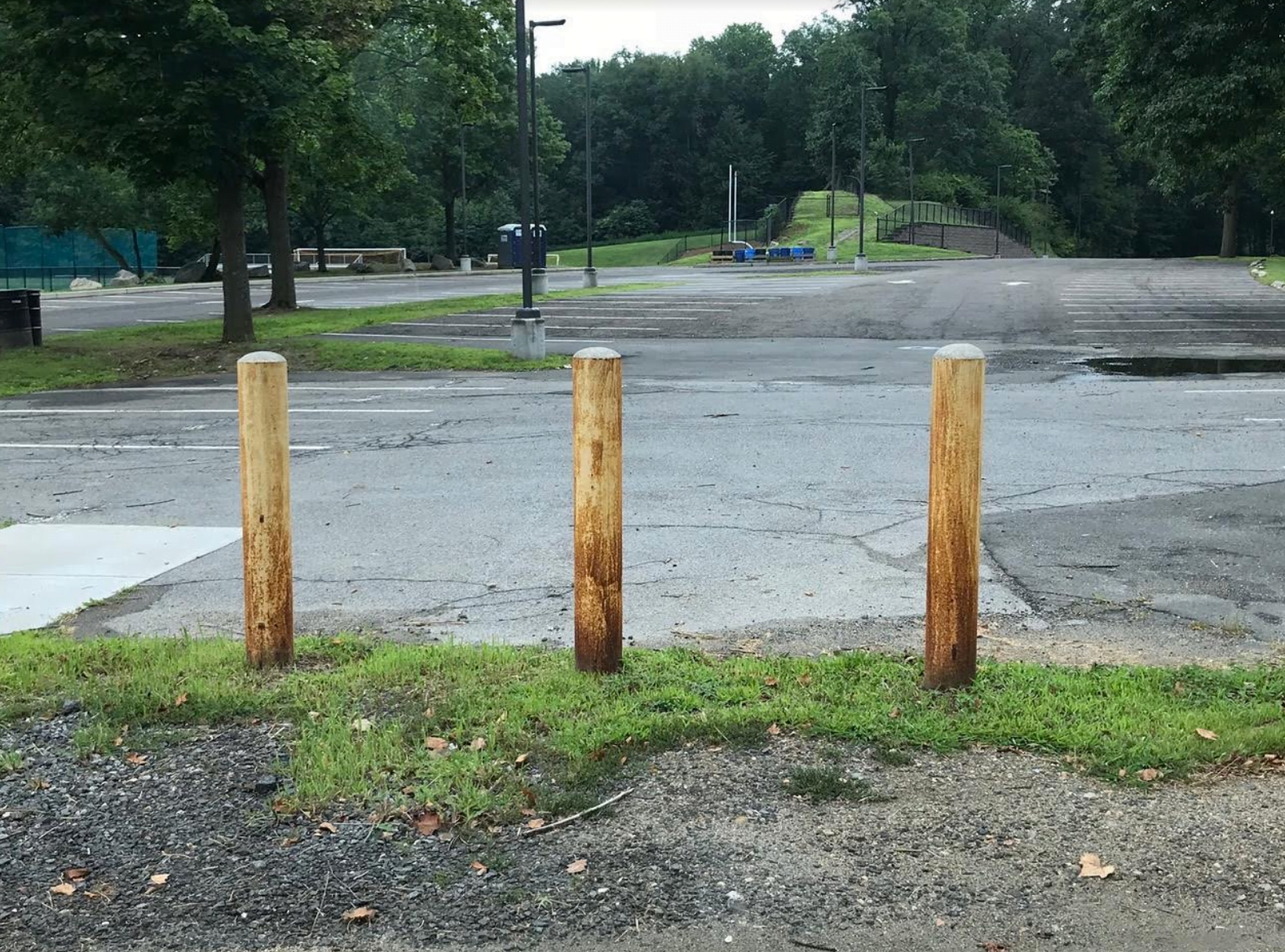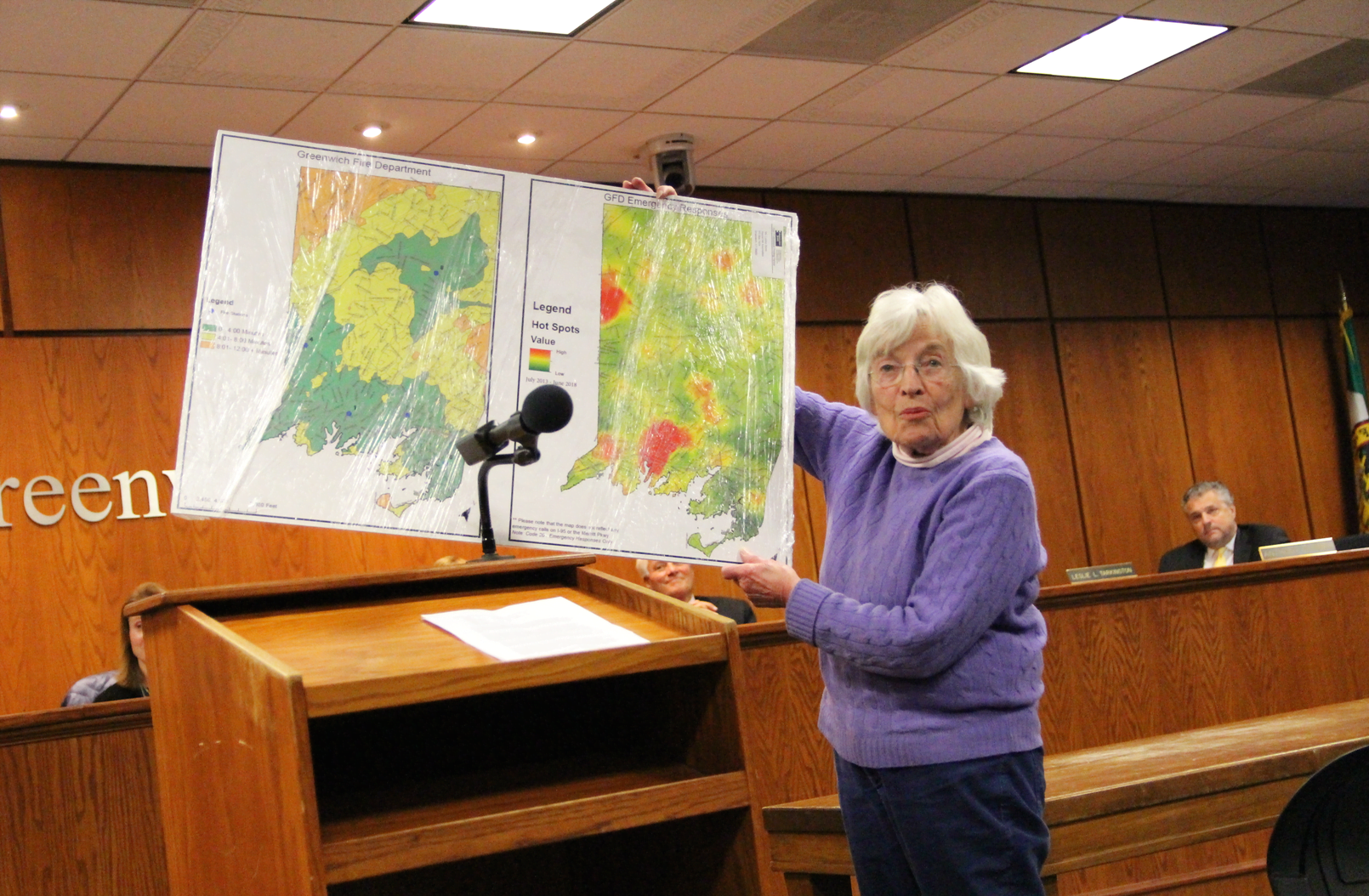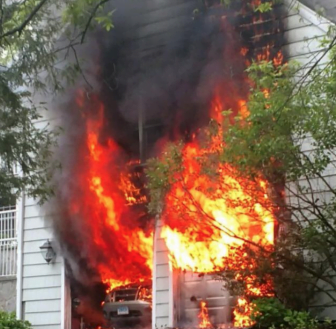On Tuesday night the BET held a public hearing for input on the Town’s proposed 2019-20 municipal budget.
Rick Kral representing the Greenwich Athletic Foundation said his organization has supported numerous athletic projects over the years (notably the new GHS gymnasium bleachers and scoreboard at Cardinal field) and has been involved in the process looking at Cardinal Field improvements for 18 months, starting back when Concept B was put forward as the most optimal.

The GAF created a map of Greenwich High School that they would like to have displayed on campus. Image: GAF
“We believed at the time it was a good plan,” he said, adding that the master facilities plan brought out a lot of other needs beyond bleachers, bathrooms, team room and concession, which are priorities of the GAF.
“We need to support a project that is going to be shovel ready quickly,” Kral said, adding, “We need to make a change of course right now. …We need to focus on the bleachers and address those immediate concerns we can do in a short period of time.”
Kral said new bleachers could be constructed so that they house building structures underneath. He suggested that would neither increase FAR, nor require a MI. Also he said it would be “more palatable to neighbors.”
He said the project could be done for approximately $5 million and the GAF would raise 20% of the project cost for phase 1.
Phase 1 includes home (2010 seats) and away bleachers (500 seats), press box, elevator, new electric service, temporary bathrooms on trailers (instead of port-o-potties), and some paving and restriping for 33 new parking spots (location of bleachers would be moved forward freeing space for the 33 parking spots).
Kral said the bleachers project would not encumber the possible future addition of a road to Putnam Ave, a bridge or tennis courts. He said fields could remain open the entire duration of the bleachers project.
“We feel the current $1.3 million in the budget would be enough to get this project started so we could do some redrafting of the plan, get it in the land use process, bring in some utilities and preliminary work to get the bleachers some time late spring next year, and going into the next budget cycle where we would look for the balance of $2.7 million,” he said. “Then we would finish the project that summer if all goes well with land use, and hopefully have it completed in time for that September football season.”
Several residents decried the condition of Cardinal Field.
Ingrid Large said for 17 years she has watched games at Cardinal Field. “I can’t understand people cannot support a beautiful field and a toilet. People are just needing to be comfortable for 2 or 3 hours at the field. …Please think about making a lot of people happy.”
Another speaker, Craig Warwick, pointed out that the private schools development is accelerating while the public schools’ facilities remain inadequate.
He cited the dark port-o-potties and teams having to walk significant distance to and from the main school building.

View of the entrance to Greenwich High School. Credit: GAF
“You drive into the GHS entrance, there is dirt everywhere,” Warwick said. “It’s not presentable. We’re supposed to be one of the best towns in the nation. We need to think bigger. It’s about the children, not the adults.”
PTA Council president Karen Hirsh urged the BET approve the BOE budgets as submitted, with no further reductions. She said the capital budget before the BET had already been cut in half.
“Sadly, the goal seems to be keeping the mill rate low and postponing funding for a future budget cycle,” she said. “…It has long term adverse impacts on our aging, under maintained facilities, which then end up costing more to repair or replace.”
Hirsh said all school facilities and campuses should be ADA compliant.
“Just because immediate compliance is not required, does not mean we should delay this work,” she said, adding that PTAC supports funding three elementary school design studies to be completed simultaneously. “Hired experts made it clear we have been underfunding facility maintenance for quite some time.”
Cricket Dyment, first VP of PTAC urged the BET to focus on upgrades at Greenwich High School. Specifically, she said the GHS entry and secondary egress and exit to the campus are both necessary to provide increased security and life safety for students and staff, and improve traffic flow.
Dyment warned that modifying the Cardinal Stadium plan from two to three phases would increase overall costs.
Clare Kilgallen said the fact that Cardinal field and 17 buildings under control of the Board of Education are not compliance with the Americans with Disabilities Act of 1990 was unconscionable.
“After 30 years it’s astounding that our schools and fields are not accessible to all,” she said.
Candace Garthwaite said she’d like the Eastern Greenwich Civic Center project to move forward but asked for more communication with residents on the project design.
“It seems that to date communication has been spotty,” she said, adding, “I’d like to see more of an overview with respect to managing flooding on Harding Rd and rehabilitation of adjacent fields. It’s all one facility, one area, and yet we’re piecemealing it. I’d like to see better coordination and planning.”
“It might make sense to get Municipal Improvement (MI) before you go ahead with designs and site plans, if we haven’t had sufficient public hearings, communication and dialog,” Garthwaite said. She went on to urge the BET to make sure Old Greenwich School be rehabilitated “as soon as possible.”
“It is not ADA compliant, has insufficient air conditioning, and is very old. It needs work,” she said. “My frustration is how we handle our capital improvement projects. We’ve had a certain method. Now, for long term projects, we need long term funding.”
Northwest Fire Station
“I support our first selectman Peter Tesei, Selectmen Litvack and Toner in their unified support of the northwest fire station,” said Monica Prihoda. “Neglecting deteriorating conditions does not attract new families, and young people we need to sustain the Town of Greenwich. Instead they move to other towns, with higher mill rates because they have better facilities.”
“If we cannot bear to raise our mill rate, we should do what other towns do, which is use long term financing,” Prihoda said.
Regarding the erroneous report from those who purported to represent the entire RTM body – they do not,” Prihoda said of an email circulated by 12 RTM members who did their own fire analysis that clashed with the analysis conducted by the Town.
Joanna Swomley agreed and said the email that circulated by the 12 RTM members was motivated by emotion and personal attacks.
“Please, chair Oberlander, don’t be swayed by excuses to derail this project. See these arguments as what they are – to save a few bucks at the expense of the safety of the northwest corner. …We deserve the same treatment as everyone else in town.”
A memo from First Selectman Peter Tesei and Fire Chief Siecienski to RTM moderator Tom Byrne, referred to the “Unfortunate manner in which the report was produced.”
The memo said neither neither Tesei nor Siecienski were engaged by the 12 RTM members before they circulated their analysis. Nor was Town staff nor any key stakeholders. They disputed the alternate analysis saying it had glaring inaccuracies including a ‘lack of simultaneous notification to volunteer engines and stations.’ This is simply not true in any manner.”
“Travel time, which is the problem we are trying to solve in NW Greenwich, is a separate and distinct discussion from processing time and turnout time,” Tesei and Siecienski wrote.
The memo pointed out that, of the 12 members that signed the report, which calls for a study as the next steps, seven members voted to delete funding for the study when it was proposed in 2016. The remaining, they said weren’t on the RTM at the time.
Lucia Jansen disagreed and said the group was 12 “data driven” RTM members who reviewed data on their own.
“It took a FOIA request for the Fire Dept to produce the reports, and it was not an erroneous task,” she said. “The Fire Chief said it took him an hour. The findings were 100% based on the fire department’s own collection of the fire incident data. If those report contained errors, as now claimed by the first selectman, that speaks to the fire department’s own generation of their reports internally and the integrity of their reporting system. A lot of data is not available or lacks completeness. We need verified clear data.”
Another of the 12 RTM members who did their own analysis, Michael Spilo, vice chair of RTM public works committee, said he objected to the data presented by the Town. He said the map of incidents does not correspond to the map of “hot spots.”
“The First Selectman’s representation of hot spots – he is using call data, not actual incidents or response time needed,” Spilo said. “What the selectman projects and what we have on the ground don’t match. Trucks aren’t always on the ground at the fire station. The current fire department is completely unreliable.”
Spilo said the Town’s data is also missing key metrics. “We need independent verification. The First Selectman’s data is in a commercial zone with no residences, and a golf course. It’s unnecessary calls by non residential customers.”

Louisa Stone showed a map of hot spots. BET meeting. March 26, 2019 Photo: Leslie Yager
“We have heard divisive nit-picking penny-pinching ideas, I won’t name any names,” said Louisa Stone. “It’s wonderful the RTM in September voted better than 2-to-1 for the First Selectman to establish if there is a need. The northwest side of town is the second most needful place.”
Stone said support for a northwest fire station comes from all parts of Greenwich.
She said that when fire trucks head up King Street to the northwest from Glenville, it leaves Glenville exposed.
“The northwest fire station has a maximum expense of $9 million. That would not require long-term bonding. It certainly could be accomplished. I’d want to get this station under way before there is a preventable tragedy.”
Allan Williams said, “There is a lot of development coming (to northwest Greenwich) in the next 20 years. A lot more traffic and ill advised proposal to put in tolling will result in choke points further slowing response times for our fire department. Please support this $100,000. Let’s get the ball rolling on a facility.”

Perkley Lane fire. Photo Greenwich Professional Firefighters Facebook
Michael Dabrowski said that on May 22 2017 his Perkley Lane house in Riverside became uninhabitable and “a total loss” after a fire.
He recalled driving home from work in Stamford, past the Sound Beach Fire Dept where there was no activity and that the first fire truck to arrive was from central Greenwich. He said it took 13 to 14 minutes for the Sound Beach Fire Dept and Cos Cob stations to assist the first engine that arrived and that the fire hydrant adjacent to his street was broken.
“I can’t help but wonder if our house could have been saved, and we could have been saved all the trauma and stress of the past couple years,” he added.
Eliminating Styrofoam Trays from Greenwich Schools Cafeterias
Julie DesChamps, PTAC Green schools committee and GRAB, voiced concern about Greenwich Schools cafeteria’s current use of styrofoam trays to serve lunch. She asked for the BETs support to fund a reusable ware and dish washing system. Lunches are currently served on styrofoam trays. “Styrofoam is a toxic, hazardous and wasteful material,” she said. “Its use in our lunchrooms has critical implications for the health of our children and the environmental footprint of the school district.”
She said the foam trays contain styrene, a possible carcinogen and neurotoxin that can leach into foods when students scrape the trays with utensils. “The most at risk are the students eligible for free and reduced lunch who are exposed to styrene for years.”
She said a safer option is to replace foam trays with reusable durable ware trays with compartments. Food Services has done an estimated cost analysis for the purchase of reusable trays and dish washing systems district wide of $110,000.
TAG – Transportation Association of Greenwich (A not-for-profit transportation service for elderly residents and disabled children and adults)
Mike Miller the board treasurer for TAG requested full release of 2020 Town funds for TAG.
“We provide over 40,000 rides annually to school age youth, seniors and disabled. We suffered loss of several large state contracts and lost over $1 million in revenues which led to operating losses of over $600,000,” he explained. “Our board and management worked with BET, RTM and others to restructure the organization to bring it back to profitability. We reduced expenses 40% from $1.3Million to $800,000.”
He said following the restructuring, the organization moved from a loss to a projected profit and they would like to purchase two new vehicles.
“I got here in a TAG van,” said Alan Gunzberg, who is legally blind. “There are plenty of people who rely on TAG to get to doctor appointments, to get a haircut or have lunch with a friend. We don’t drive. It’s your responsibility as a town to make sure we have transportation that is accessible and viable. We have an organization who does it. It’s incumbent on you to fund them. Not only because it is the right thing to do but because you’re bound by the law to do that. We really need to support TAG, otherwise people will like me will be stuck at home.”